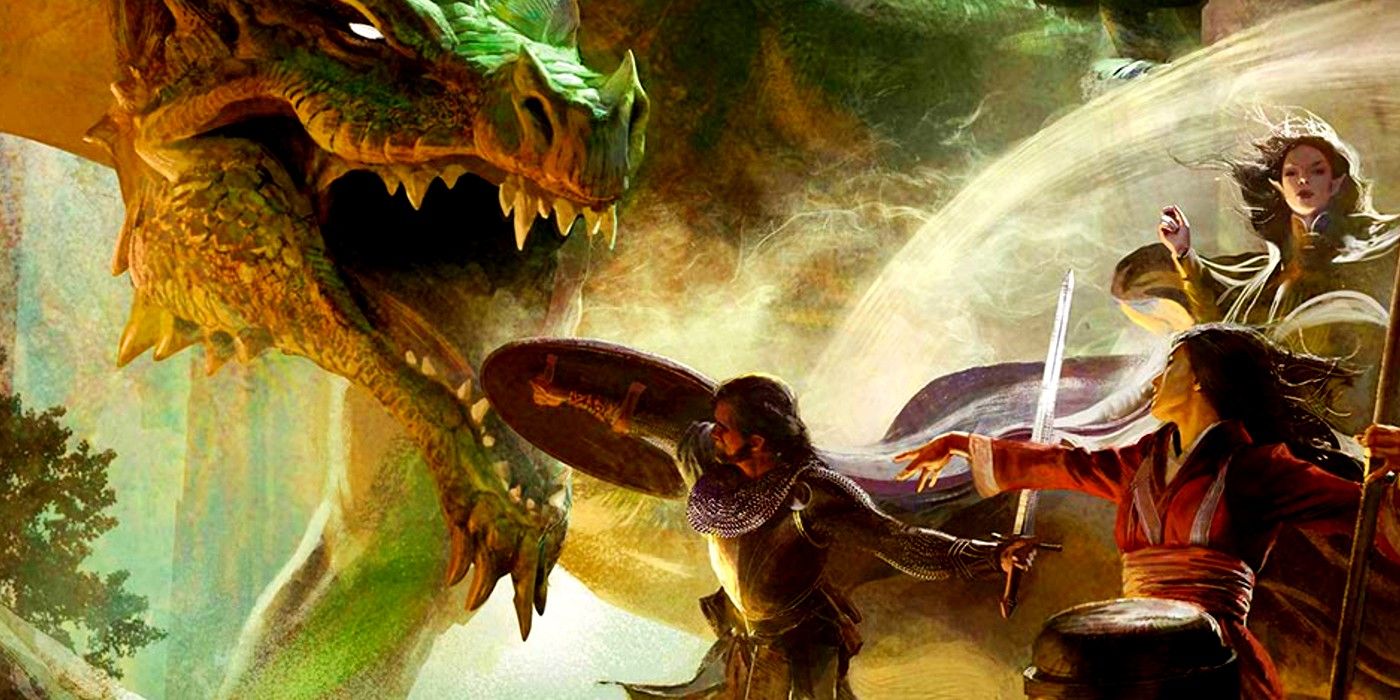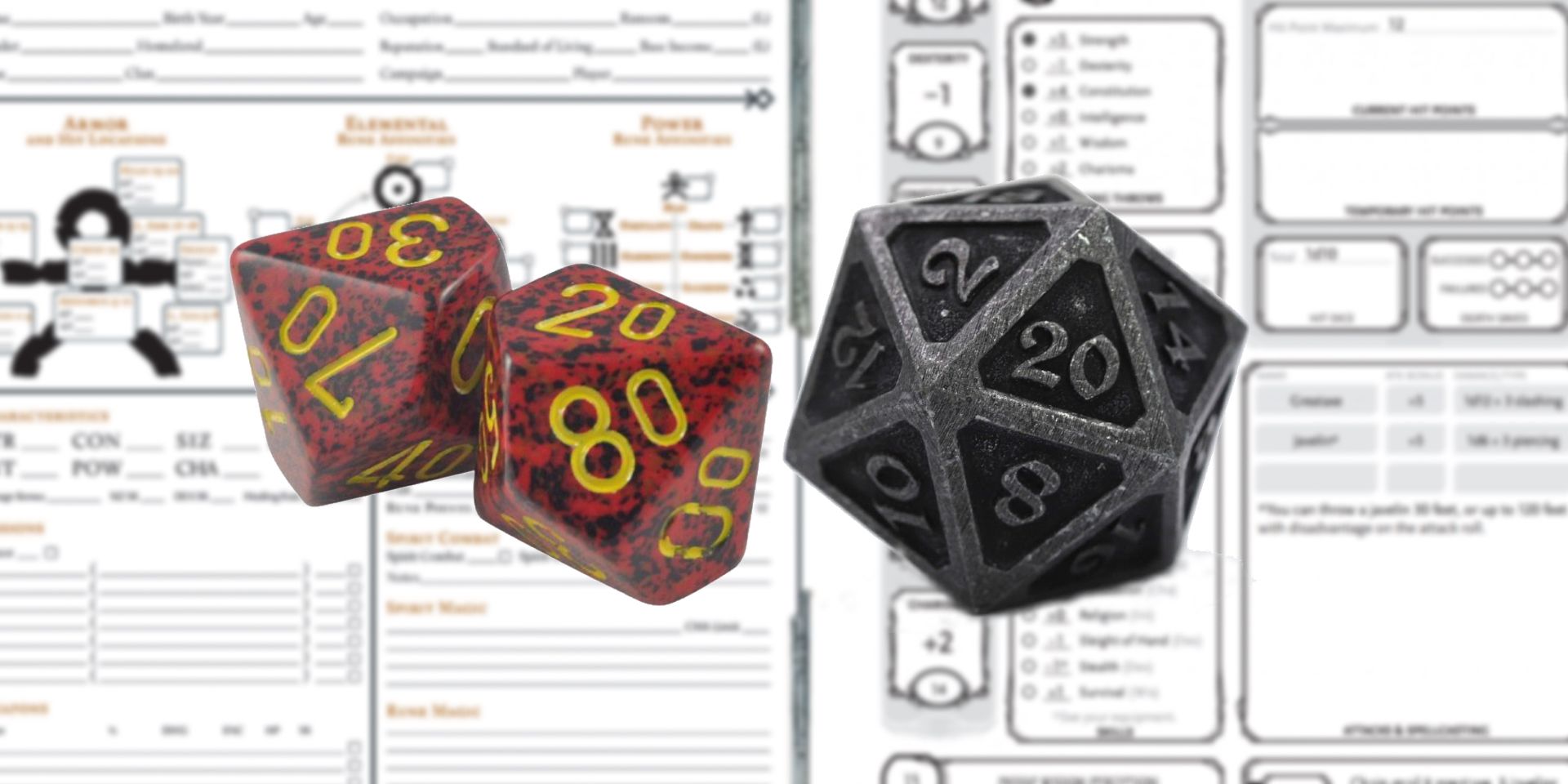When Tabletop GMs Should (& Shouldn’t) Ask Players To Roll Dice
When should Game Masters of tabletop roleplaying games ask their players to roll dice, and when should they let PCs automatically succeed?
You Are Reading :When Tabletop GMs Should (& Shouldn’t) Ask Players To Roll Dice

Decades after the first editions of Dungeons & Dragons were published in the late 1970s, the majority of tabletop roleplaying games currently on the market still pair storytelling with with dice-rolling – using the randomness of dice (or cards or coins) to introduce twists of fortune and fate into the plots woven by players and game masters. But when should dice be rolled during a tabletop RPG session, and are dice even necessary to run a good RPG campaign? There are no hard answers to these questions, but there are a few consistent principles Game Masters should keep in mind.
When game designers Gary Gygax and Dave Arneson came up with the core rules for Dungeons & Dragons, the world’s first roleplaying game, they borrowed the dice-rolling mechanics used in tabletop war games of the time to decide the outcome of risky or dangerous actions during their fantasy game sessions. Rolls made to attack enemies were resolved by rolling a twenty-sided die, adding a bonus from a player character’s attribute, and comparing it to a set difficulty rating, while other polyhedral dice were used to calculate weapon damage, detect traps, listen at doors, etc.
Tabletop RPGs that came after and built on D&D – RuneQuest, Shadowrun, World Of Darkness, Apocalypse World, FATE – came up with newer, varied mechanics for figuring out the probability of player characters succeeding or failing at their heroic deeds. Some of these games use percentile dice, others dice pools of six-sided or ten-sided dice. Nearly all of these RPGs used the same principle of “roll dice, add bonuses based on PC abilities, then compare to a pre-set difficulty rating.” More important than how one rolls dice in a roleplaying game, however, is the question of when RPG players should roll dice.
RPG Players Should Roll Dice During Moments of Danger & Challenge

Outside of combat scenes, stealthy infiltrations, and tense negotiations, players don’t really need to roll dice or even look at their character sheets into order to play through a session of a tabletop RPG. All they need to do is listen to the Game Master’s descriptions, describe what their characters do and say in response, then work with the Game Master to figure out the logical consequences of said actions. Common sense and real-world experience will suffice for roleplaying scenes that take place in peaceful, friendly places – buy a street urchin some dinner, for instance, and they’ll probably be happy to talk about the secrets and rumors they’ve overheard.
Dice rolls in tabletop RPGs (and the rules used to interpret them) mostly come into play during parts of the narrative that are dangerous and difficult – fighting through a dungeon, infiltrating a space station, negotiating a ceasefire, etc. Everyone want their “original characters” to be cool, competent badasses who pull off jaw-dropping feats of derring-do… but without the actual risk of failure, the “feats of derring-do” players describe are essentially meaningless.
Purely narrative tabletop RPGs where the Game Master decides outcomes by fiat also run the risk of resembling those childhood games of “Cops and Robbers” where kid argue back and forth over “who shot who.” Dice, in this respect, are a “scapegoat” of sorts for participants in a tabletop RPG; when things go poorly for players or GMs, they can blame the dice instead of each other.
RPG Players Should Roll Dice When Both Success & Failure Would Be Interesting

Vintage tabletop roleplaying games like Dungeons & Dragons, RuneQuest, or Mage: the Ascension tend to have dice-rolling rules with a binary “pass/fail” paradigm. On a good roll, a player character does what they set out to do, and on a bad roll, they don’t. In scenarios like turn-based combat, awful dice rolls in a binary “pass/fail” system are generally fine, since players will get a chance to attack again next round.
In other scenarios, like picking the lock of a door, searching a crime scene for clues, petitioning the chieftain of a nomadic tribe for aid, or performing first aid on a dying friend, poor dice rolls can frustrate players and trap Game Masters in a Catch-22. If they let a player repeat their skill check over and over again until they get a successful result, the act of rolling dice becomes pointless. If they only give their players a single chance to succeed, a moment of bad luck can permanently cut off players from interesting parts of the game world the GM worked hard to create.
Contemporary RPG systems frequently give players and GMs special game mechanics they can use to mitigate the fickle variability of dice. “Powered By The Apocalypse” games, for instance, have special dice-rolling rules called “Moves” that list different kinds of “partial success” – outcomes where PCs can succeed at their actions despite poor rolls, but at the cost of resources, injuries, or other sacrifices on the part of the PC. Systems like “FATE,” “Savage Worlds,” or “Chronicles of Darkness” give players “Power Points” of some kind – limited resources they can spend to improve their odds of success when the stakes are high and they really, really want to succeed.
In systems like Dungeons & Dragons with fewer explicit rules for letting players “succeed at a cost,” the onus lies on the Dungeon Master/Game Master to make sure players who roll dice are thrilled by both “success” and “failure.” If a Player Character “failing” at a task would be boring or detrimental to the game’ plot, the GM should probably just let them succeed without asking them for a roll. Alternately, a GM can get creative, describing how a PC “fails” in a way that’s entertaining and moves the game’s story forward.
The thief picks the lock to the vault, but sets off an alarm by accident. The wise old wizard isn’t convinced by the bard’s silver words, but will assist the party if they fetch a rare herb from the depths of a dark and spooky forest. The mystery-solving sleuth discovers a vital clue, but gets ambushed by thugs hired to silence their meddling inquiries, etc. Ideally, the choices of what happens when someone fails needs to be interesting.
Link Source : https://screenrant.com/tabletop-rpg-dice-rolling-rules-game-master-choice/
